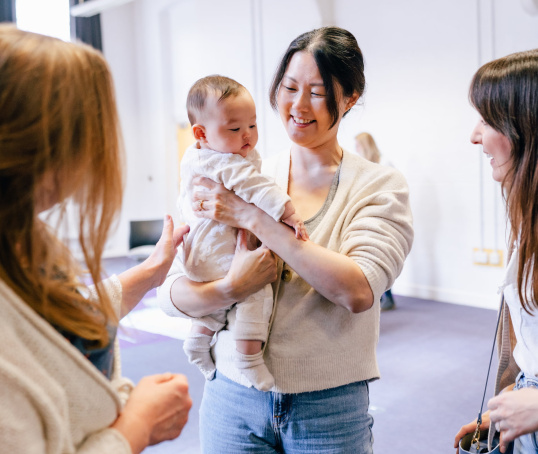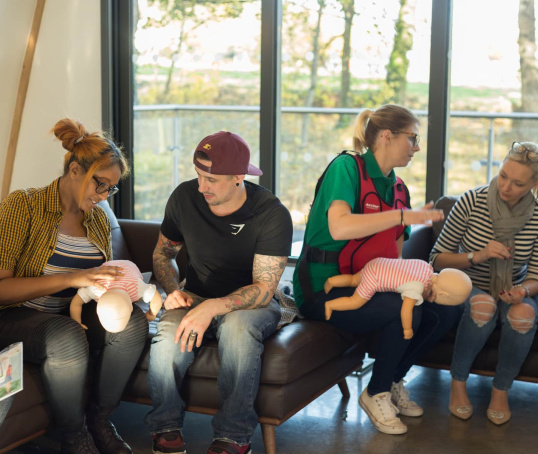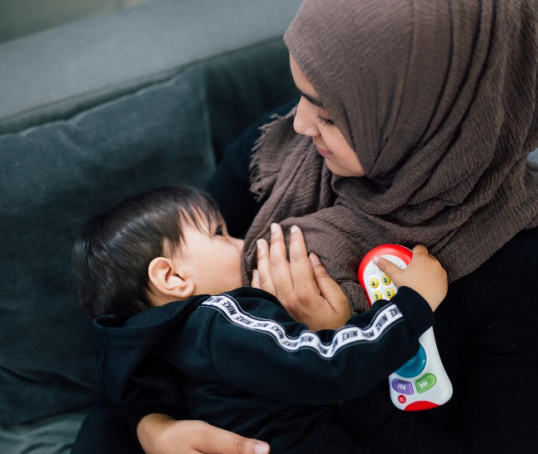In the first three months, your baby will be growing and developing a lot. We look at what to expect at this age – from feeding to bath time to sleep.
This is the start of your new life as a parent. There’s so much to look forward to like their first smile but you’re bound to be feeling some nerves too.
The early days can be exciting, challenging and rewarding. We’re here to help support you through your first 1,000 days of being a parent. Read on to find out what you can expect in your baby’s development from birth to three months.
Development
As a new parent you of course want to make sure your baby is healthy and growing well. It’s normal for newborn babies to lose 6% to 7% of their body weight in the first two weeks after birth – so don’t worry (NHS Choices, 2017).
Every baby is unique. Some babies might eat and sleep more than anything else in the first few weeks. Others can be very awake and alert, and some can be very fussy and upset (St James Roberts, 2012).
Feeding
Whether you are breastfeeding your baby, formula feeding, or using a combination, one thing is certain. Feeding your baby will be one of your most time-consuming tasks at this age. Your baby will need to feed frequently around the clock.
If you feel unsure about how well your baby is feeding, the contents of your baby’s nappies are a good indication. If you have questions about feeding your baby, you can call the NCT support line on 0300 330 0771 (8am–10pm, seven days a week).
For the first six months of your baby’s life, they will get all the nutrients they need from breast milk or formula. Babies should only start on solids when they are six months old (NHS Choices, 2018).
Health
Your baby will have their first immunisations when they are eight weeks old (NHS Choices, 2016). They then get boosters at 12 weeks and 16 weeks. For more details read our immunisations schedule article.
Sleeping
All babies are different but at this age you can expect your baby to wake up during the night for feeds. Their tummy is still tiny, so they need to feed little and often.
Some parents find swaddling their newborn helps to settle them. Some evidence does support this practice (van Sleuwen et al, 2007).
Your baby’s sleeping patterns will change as they grow. Ask for help if you need it. It’s important you try to sleep or rest when you can, to help you cope with sleepless nights.
Crying
Newborn babies can cry a lot. It’s usually because they are hungry or tired but it can be hard to tell. When your baby starts crying, going through a checklist of likely causes can help you find out what’s wrong quickly.
Sometimes small babies suffer from colic – unexplained and excessive crying. If you are concerned about your baby’s crying, talk to a health professional.
Hearing your baby cry a lot can be very hard to deal with so make sure you get support. Talking with other parents about their experiences is always helpful - why not join your local NCT Early Days group or Bumps and Babies group.
Baby care
At this age, you don’t need to bathe your baby daily (NHS Choices, 2015). Bathing your baby three or four times a week is usually enough, though a bath can be an enjoyable part of a bedtime routine. Bath time can be a great way for partners to get involved. You don’t need to add any products to bath water, plain water is best during your baby’s first month.
Your baby will need a lot of nappies. You have plenty of nappy options from disposable to reusable types, so take time to consider what’s best for you and your baby.
Playtime
As your newborn baby grows, they will take more interest in the world around them. Playing will become increasingly important as this is how babies learn and develop.
By three months your baby will begin to turn their head, kick their legs, make eye contact and smile. Colourful baby mobiles and bold black and white pictures will usually attract their attention. So will shaking rattles or the sound of voices.
Some babies like to lie on ‘baby gyms’. These are arches with objects like bells or mirrors dangling from them. Your baby will also love to watch your face as you sing, read or talk to them (Murray, 2014).
Safety
As your baby becomes more mobile and you become more confident getting out and about, make sure you are keeping safety in mind.
At this age it’s worth noting these recommendations from the Child Accident Prevention Trust:
- Don’t leave your baby alone on a bed or other surface they could roll off.
- Check your car seat regularly for fit, both for your baby and in the car.
- Always use the appropriate harness in your buggy or pushchair.
Taking care of yourself
The first months after giving birth are exciting, challenging and tiring. You need to look after yourself as well as your baby. Read our top tips on how to look after yourself after having a baby.
- Sleep when your baby sleeps, even if it means napping in the day. If you can’t sleep, do at least try to rest: put your feet up with a magazine or watch a bit of TV.
- Don’t be afraid to ask for help from friends and relatives.
- Go out for a walk each day with your baby.
- Join an NCT Early Days course or Bumps and Babies group – meeting other mothers can give you something to look forward to and other people to talk to who are at the same stage in life.
- Try to do some exercise, especially pelvic floor exercises.
- Many new mums experience ‘baby blues’ within the first few days after their baby is born. Amid the tiredness, upheaval and physical impact of giving birth, it’s hardly surprising if some mums feel a little down. The ‘baby blues’ include crying unexpectedly and feeling that you can’t cope. Usually this passes but if it doesn’t it could be a sign of postnatal depression (PND). There is plenty of help, advice and support for new parents suffering from PND so don’t be afraid to talk about any concerns you have with your friends, family, GP or local health visitor.
- The arrival of a new baby is also bound to have an impact on your relationships with your partner, family and friends. Understanding how your relationships might change will help you to adjust confidently and happily to life with a new baby.
This page was last reviewed in October 2017
Further Information
Our support line offers practical and emotional support with feeding your baby and general enquiries for parents, members and volunteers: 0300 330 0700.
You might find one of our Early Days groups helpful as they give you the opportunity to explore different approaches to important parenting issues with a qualified group leader and other new parents in your area.
Make friends with other parents-to-be and new parents in your local area for support and friendship by seeing what NCT activities are happening nearby.
Read our top tips on how to help look after yourself after having a baby.
Information from NHS Choices on postnatal depression and how to eat healthily.
Cry-sis helpline 0800 448 0737. Lines open 7 days a week 9am – 10pm.
Murray L. (2014) The psychology of babies. London: Robinson. [Accessed 1st October 2017].
NHS Choices. (2015) Washing and Bathing your baby. Available from: http://www.nhs.uk/Conditions/pregnancy-and-baby/Pages/washing-your-baby.aspx [Accessed 1st October 2017].
NHS Choices. (2016) Vaccinations. Available from: http://www.nhs.uk/Conditions/vaccinations/pages/vaccination-schedule-age-checklist.aspx [Accessed 1st October 2017].
NHS Choices. (2017) Your baby’s weight and height. Available from: http://www.nhs.uk/Conditions/pregnancy-and-baby/Pages/baby-weight-and-height.aspx [Accessed 1st October 2017].
NHS Choices (2018) Your baby's first solid foods. Available from: https://www.nhs.uk/conditions/pregnancy-and-baby/solid-foods-weaning/ [Accessed 1st October 2017].
St James Roberts I. (2012) The origins, prevention and treatment of infant crying and sleeping problems. London, Routledge. [Accessed 1st October 2017].
Van Sleuwen BE, Engelberts AC, Boere-Boonekamp MM, Kuis W, Schulpen TWJ, L’hoir MP. (2007) Swaddling: a systematic review. Pediatrics 120:1097-1106. Available from: http://pediatrics.aappublications.org/content/120/4/e1097?sso=1&sso_redirect_count=1&nfstatus=401&nftoken=00000000-0000-0000-0000-000000000000&nfstatusdescription=ERROR%3a+No+local+token [Accessed 1st October 2017].
Further reading
NHS. (2015) What to expect after vaccinations. Available from: https://www.gov.uk/government/uploads/system/uploads/attachment_data/file/448789/8584-what-to-expect-after-vaccination-2015-2P-A5-02-web.pdf [Accessed 1st October 2017].



